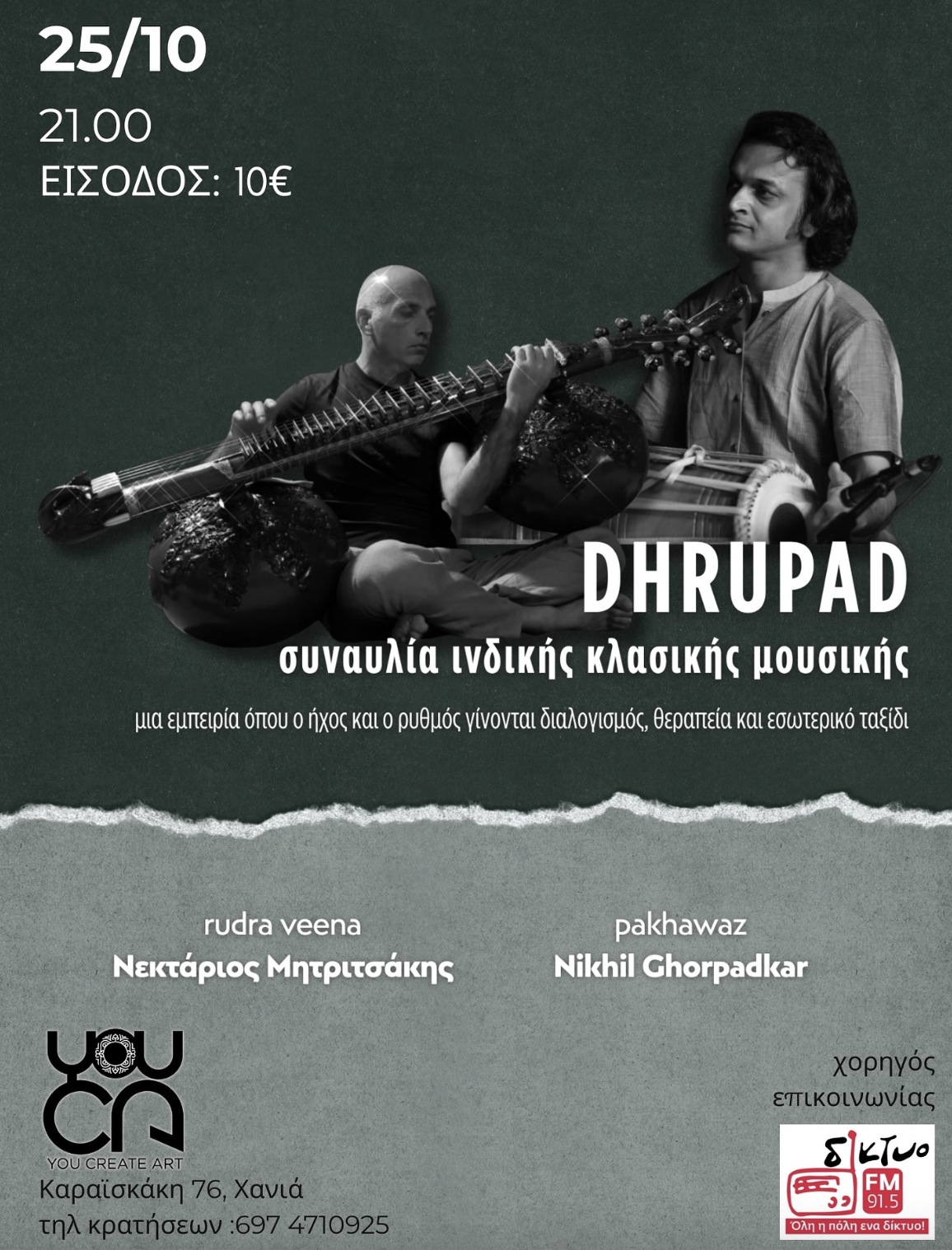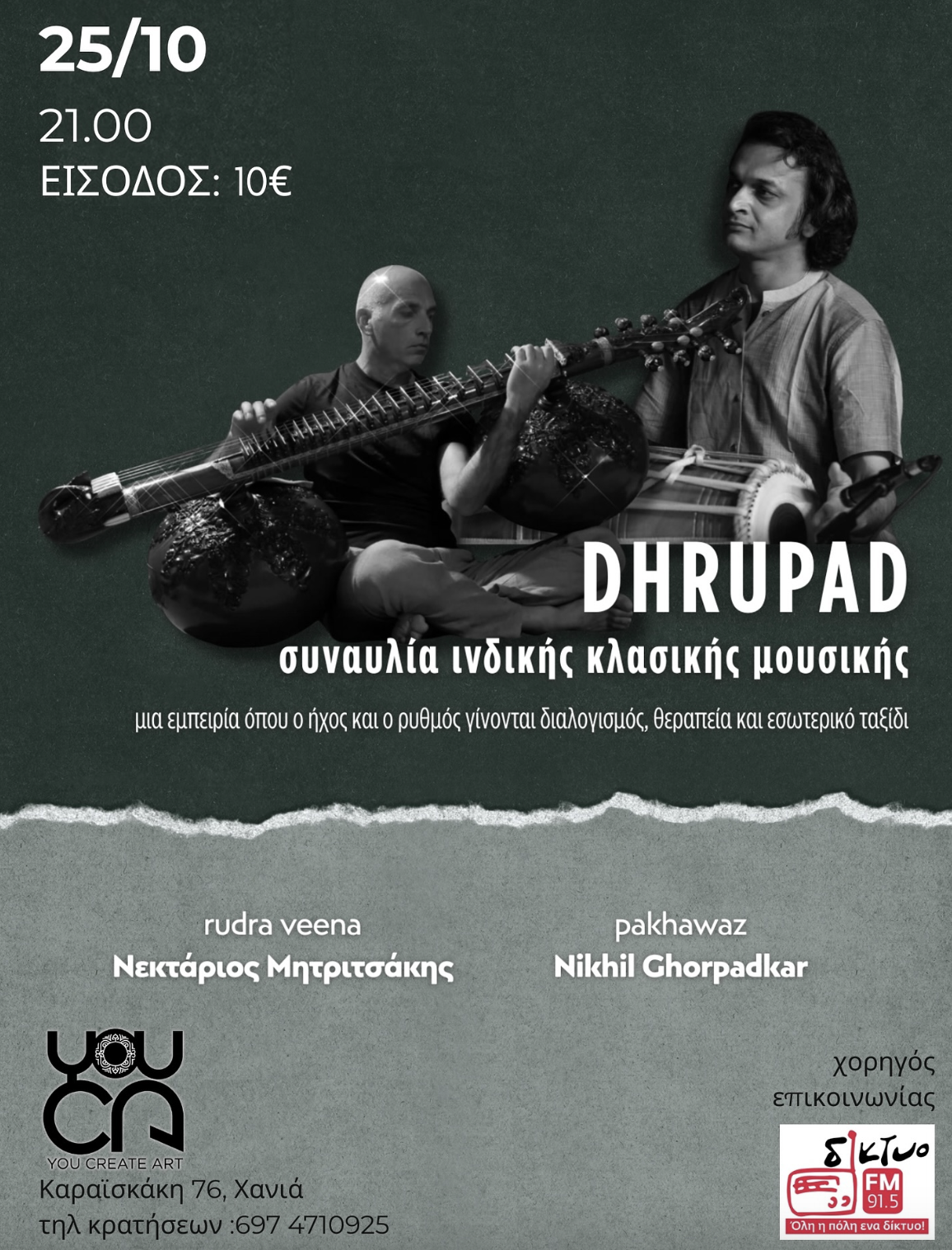Concert “A Meditative Journey Through the Timeless Ocean of Sound” (Indian classical music) – Chania 25th October
An evening dedicated to the most ancient form of Indian classical music, Dhrupad – where sound itself becomes yoga, known as Nada Yoga.
WHEN: 25th October, 21.00 – 22.30
WHERE: Youca Theatre, Karaiskaki 76, Chania
Entrance: € 10,-
Reservation: +30 6980186013 or +30 6974479895
At the heart of the experience are two sacred instruments: the Rudra Veena, the primordial stringed instrument and ancestor of the Sitar, and the Pakhawaz, the forerunner of the Tabla and pulse of rhythm.
A touch of sound, a wave of rhythm; the Rudra Veena and the Pakhawaz meet, weaving a dialogue between silence and the breath of the world.
This musical journey is not mere listening. It is a meditation that becomes light,a secret gateway opening into the inner space, where the unspoken and the hidden quietly emerge.
The music—at times lyrical and fragile, at times deep and resonant— does not simply entertain;
it invites, it calls, to a meditative voyage across the waves of sound and soul.
And while the seasoned listener may sink even deeper, even one who encounters this sound for the first time feels the healing, the beauty, the secret stillness that the music bestows.
Event Description
An evening dedicated to the most ancient form of Indian classical music, Dhrupad – where sound itself becomes yoga, known as Nada Yoga.
At the heart of the experience are two sacred instruments: the Rudra Veena, the primordial stringed instrument and ancestor of the Sitar, and the Pakhawaz, the forerunner of the Tabla and pulse of rhythm.
Through the waves of sound (Raga) and the pulsations of rhythm (Tala), unfolds a musical journey beyond entertainment – a meditative, deeply healing experience that touches the soul and brings serenity to the mind.
This music requires no prior knowledge, only an open mind and heart. Its benefits can be felt as a gentle awakening of the body’s energy centers, as a subtle therapy flowing within, leading us into inner stillness.
Here, sound is not merely melody; it is a teacher, a gateway to universal laws, a path of spiritual unfolding.
Participation may be seated, lying down, or expressed through free movement, wherever rhythm invites the body to flow.
Musical Instruments:
Rudra Veena
The Rudra Veena is one of the earliest instruments introduced into Indian classical music.
The name “Rudra” is an epithet of the god Shiva, and thus Rudra Veena means “the Veena beloved of Shiva.”
According to Indian mythology, Shiva created this stringed instrument, inspired by the beauty of his consort, Parvati.
Linguistically, Rudra is also thought to derive from the Persian word rud, meaning “string.”
Ravana, the mythical king and musician, was famed as a virtuoso of the Rudra Veena and is said to have used it in his worship of Shiva.
The Rudra Veena symbolizes Indian ethos throughout the subcontinent and is regarded as the only acoustic stringed instrument capable of producing the sound of Om, the ultimate reality. It is therefore called “the mother of all stringed instruments.”
Today, this ancient instrument is rarely played. Its deep connection with Shiva made it highly valued among yogis and ascetics, who approach it as both ritual and meditation. Its sound is believed to purify and calm the mind, elevating the consciousness of both the musician and the listener.
Despite its historical significance, the Rudra Veena is now on the verge of extinction, with only a few practitioners remaining. Mastery requires lifelong dedication and discipline. Yet, in recent years, renewed interest has emerged from an international audience seeking profound spiritual experiences.
Sound therapy and modern yoga practices have also embraced the Rudra Veena for stress and anxiety relief. Its deep, resonant, and penetrating tone makes it the principal instrument of Dhrupad music and the Alap.
Pakhawaz
The Pakhawaz is the traditional percussion instrument most commonly associated with the Dhrupad style of Indian classical music, though it is occasionally used to accompany other musical and dance performances. Its tone is deep, gentle, and rich in harmonics.
Influenced by Persian culture after the 15th century, it was named Pakhawaz. Some scholars trace the name to the combination of the words pakshe vadya, while others derive it from the Persian pakh awaz, meaning “soft sound.”
The Pakhawaz became the primary percussion instrument in northern India, while the mridangam assumed that role in the southern system. Although the term mridang was historically used for this drum in both texts and poetry, today the name Pakhawaz is standard.
It remains the principal percussion accompanying Dhrupad music, both vocal and orchestral, alongside instruments such as the Veena, Rabab, Sursringar, and Surbahar.
Biography:
Nektarios Mitritsakis was born and raised in Chania, Crete.
Through his connection with nature and his close relationship with music, he expressed every inner restlessness and search of the soul.
At the age of 25, he decided to dedicate himself seriously to music. After exploring rock, jazz, blues, and the traditional music of Crete, in 1995 he attended a concert of Indian classical music that stirred a profound calling within him, leading him to travel to India and return with a Sitar.
He began his first lessons with Ross Daly and explored various instruments including the Sitar, Saz, Lyra, and Lute. From 1998, for approximately 12 years, he spent extended periods in Varanasi, North India, studying Sitar and Surbahar (bass Sitar) under Rabindra Narayan Goswami.
There, he had the opportunity to meet distinguished musicians of the tradition, participate in festivals such as the Dhrupad Mela in Varanasi, and deepen his apprenticeship under the guidance of his guru, following the traditional Guru-Shishya path. Simultaneously, he earned a Sitar diploma from the Prayag Sangit Samiti in Allahabad.
Seeking balance of body and spirit, he studied Vedic astrology, practiced Ashtanga Yoga, and adopted Vipassana meditation as part of his daily life.
Guided from the beginning by the Dhrupad tradition, he encountered the Rudra Veena, studying and deepening his practice with Bahauddin Dagar, a pursuit he continues to this day.
Continuing to travel to India from time to time, he now resides in Crete, where he shares his knowledge and experience by teaching yoga and music.
Through his concerts, listeners can experience the journey of the soul through sound, feeling the serenity and beauty music brings, becoming a close companion on the spiritual path.
Nikhil Ghorpadkar
Nikhil Ghorpadkar is a distinguished Pakhawaz musician from Pune, India. Over the past decade, he has captivated audiences across the country and performed in numerous European countries.
He belongs to a brilliant, unbroken lineage of Pakhawaz masters. His musical heritage traces back to his late ancestor Pandit Shankar Bhaiyya (Ghorpadkar) and extends to the world-renowned Pandit Vasantarao Ghorpadkar. Today, Nikhil effectively represents the tradition of his forefathers within the Panse Gharana music lineage.
His father’s maternal side is also connected to prominent musicians who served as court musicians for the powerful Peshwas. In addition, Nikhil has broadened his musical horizons through the Kudau Singh Gharana tradition, studying under the late Ramakant Pathak from Lucknow.
Nikhil is an artist affiliated with the Indian Council for Cultural Relations (ICCR) and a performer for All India Radio. He teaches at Lalit Kala Kendra in Pune and at the Bharati Vidyapeeth School of Performing Arts, while successfully conducting workshops and masterclasses at schools, universities, and institutions such as the School of Fine and Performing Arts, the Film and Television Institute of India (FTII), and the Department of Media & Communication.
He has performed extensively both in India and abroad, mastering the instrument as both a soloist and accompanist. Moreover, he has collaborated with musicians and artists internationally on the experimental music scene.
Sources: kritievents.com, Youca Theatre



